These DU Students Are Helping Disabled People Make Clothes for Their Own Community & Earn From It!
“Adaptive clothing is not just about design. It’s about independence and giving people with disabilities the freedom to express themselves without limitations. It’s about making them feel heard,” says Avishi Gupta, a 20-year-old student at Delhi University’s Delhi College of Arts and Commerce (DCAC).
In a world where the conversations around disability are still gaining momentum, the students of Enactus DCAC — a student-run social impact society at DCAC — are turning those conversations into action. Through their social entrepreneurship initiative, ‘Project Riayat’, the student-led team is modernising the adaptive clothing industry by making it functional, inclusive, and empowering. Their goal is simple: to make a tangible difference in the lives of persons with disabilities.
Since founding Project Riayat in 2023, Avishi, its co-founder and former president, along with current project head Mysha Urooj, has been driving a mission that goes far beyond traditional fashion design.
A personal struggle sparks a powerful idea
It all began when Avishi, then 18, noticed a family member struggling with everyday clothing. Her relative, who had a lower limb disability and used a wheelchair, found it difficult to wear regular clothes. This inspired her to create a solution through design.
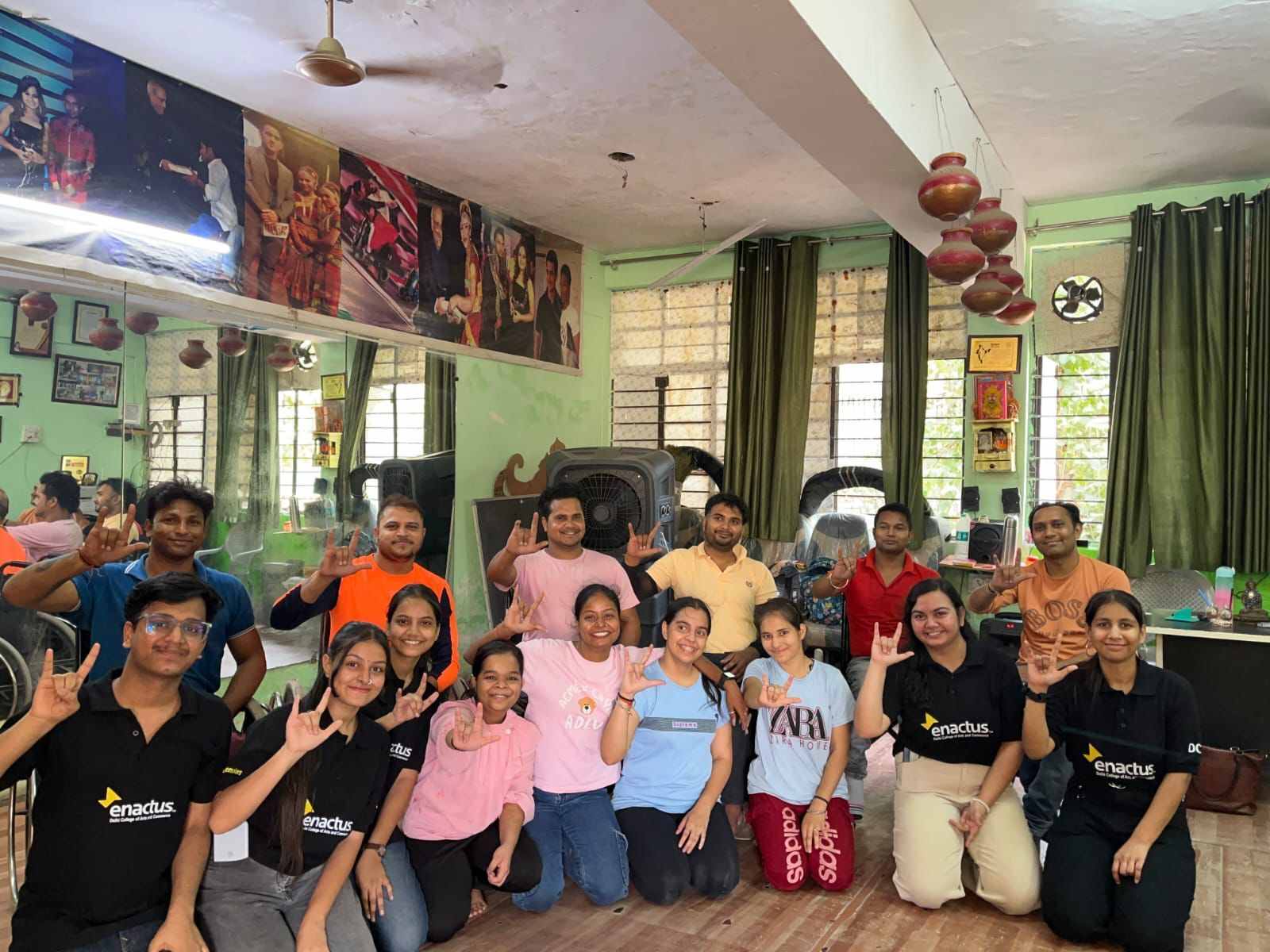 Enactus DCAC team conducted a survey to understand the needs of people with disabilities
Enactus DCAC team conducted a survey to understand the needs of people with disabilities
“But first, we wanted to make sure that this was a real problem faced by many, not just an isolated case,” Avishi explains.
Along with co-founders Umang Bansal and Ananya Goel, she began researching the issue by speaking to people with disabilities and examining data. Ananya later stepped back to pursue other goals.
Their research started at the Pandit Deendayal Upadhyaya National Institute for Persons with Physical Disabilities, where they spoke directly with individuals facing such challenges. They also engaged with children with disabilities and others in similar situations to gain a wide perspective.
“To gather more insights, we created a detailed survey with thoughtfully crafted questions and reached out to people personally,” Avishi recalls. “When we spoke to dancers with disabilities, we were shocked to hear how hard it was for them to manage costume changes or menstruation during performances.”
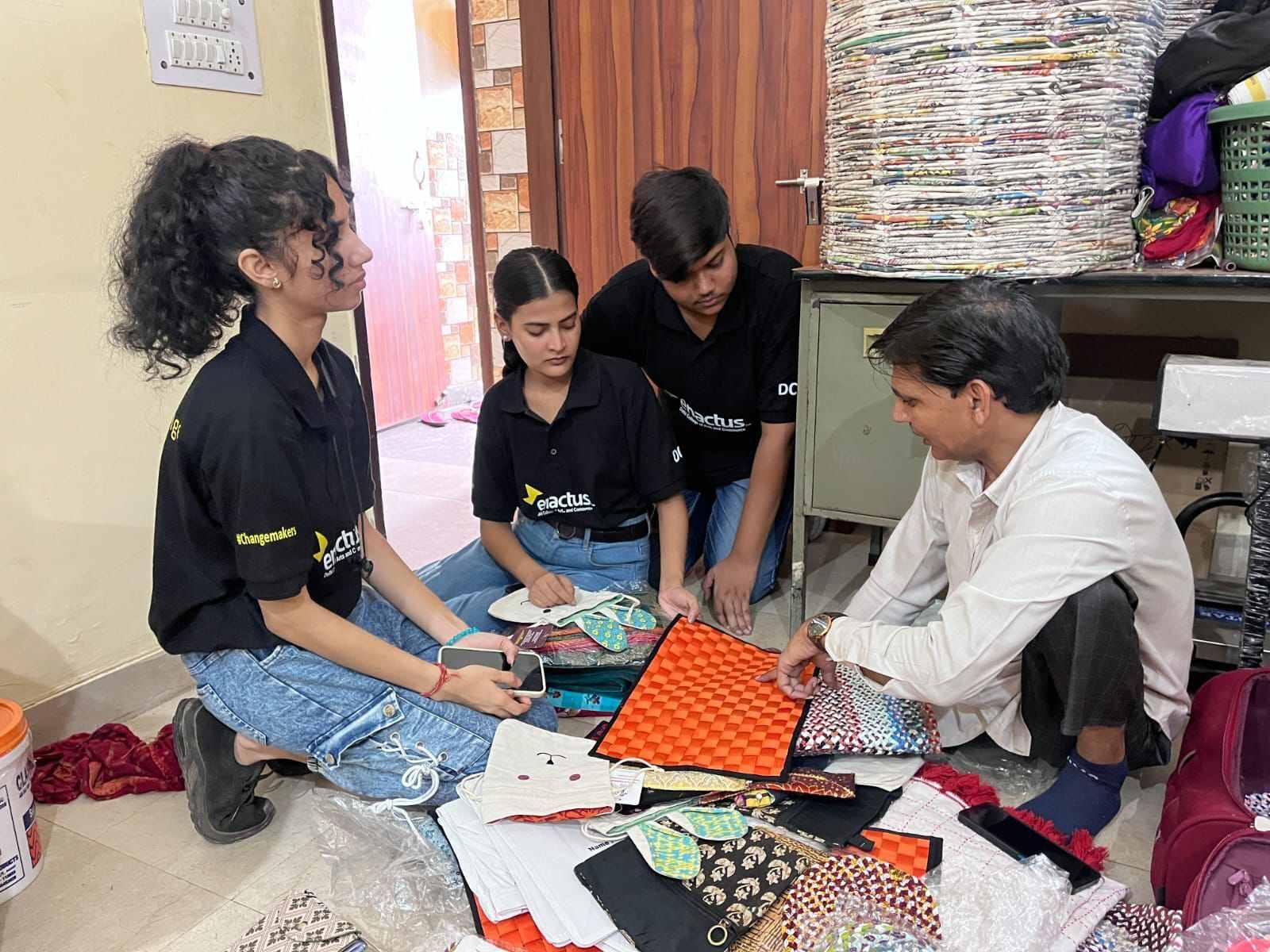 The master tailor teaches people with disabilities to stitch adaptive clothing
The master tailor teaches people with disabilities to stitch adaptive clothing
This led to one of their earliest innovations: adaptive pants with adjustable padding to make it easier for individuals with lower limb disabilities to manage their daily needs without assistance.
As the project grew, so did its scope. From wheelchair users to children with disabilities, the team focused on designing clothing that gave users more autonomy. One example is adaptive pants with side zippers, specifically created for amputees to wear with ease.
‘Because those who wear it know it best’
One of the most powerful aspects of Project Riayat is its focus on giving people with disabilities the opportunity to become part of the solution. “We knew that we wanted to make adaptive clothing, but we also wanted to empower those who best understood these challenges,” says Avishi.
So, the team partnered with Family of Disabled (FOD), a Delhi-based non-profit that supports the education, employment, and entrepreneurship of people with disabilities. Through this partnership, individuals are equipped with tools, mentorship, and hands-on training to help them build skills and confidence, all while creating products for their own community.
“We provide electric sewing machines to those with lower limb issues, allowing them to sew more comfortably, and FOD’s master tailor mentors them,” explains Mysha. “This makes them feel included, valued, and most importantly, independent.”
Currently, about 25–30 people with disabilities are directly involved in making the clothes. The team also works with individuals from FOD and NIMHANS (National Institute of Mental Health and Neurosciences), who contribute handicrafts and artwork to the project. These are sold on the project’s website, and the revenue is returned to the creators. “In total, we are trying to help out around 100 people with disabilities,” shares Mysha.
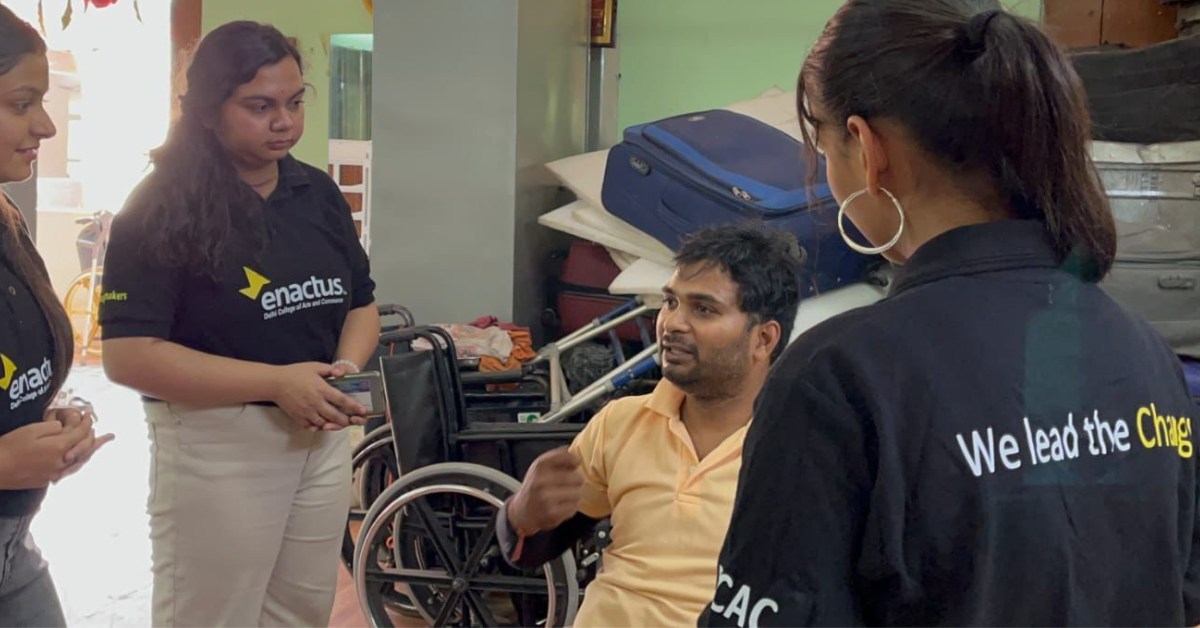 About 25–30 people with disabilities are directly involved in making the clothes
About 25–30 people with disabilities are directly involved in making the clothes
Preeti Johar, CEO of FOD, shares that working with the Project Riayat team made them realise the everyday struggles people with disabilities face to wear clothes that work for them. “Collaborating with the college students opened our eyes to the true magnitude of the problem. Enactus DCAC plays a major role in addressing this — not just by designing adaptive clothing but by driving sustainable, long-term change.”
She adds, “Their efforts have created job opportunities and helped us market our handicrafts through both B2B and B2C channels. This exposure has allowed us to reach a broader audience and significantly increase our sales.”
Recalling the initial days of creating adaptive clothing, Preeti notes, “It was difficult at first, but the students provided us with helpful samples and guided us throughout the process. We’ve since trained more people and expanded our work.”
Preeti also shares that they “genuinely enjoy” the work they do. “Not only does it provide people with disabilities with a sustainable income, it also gives us the chance to make a real difference in our community,” she reasons.
The right mentors, materials, and mindset
The students realised that collaboration was key to scaling the project and ensuring that the products they were creating truly met the needs of their users.
So, they partnered with Zyenika, a design startup that creates inclusive and adaptive clothing for people with disabilities, and international mentors like Dewey Clothing, a UK-based adaptive fashion brand catering to people with short stature and other disabilities.
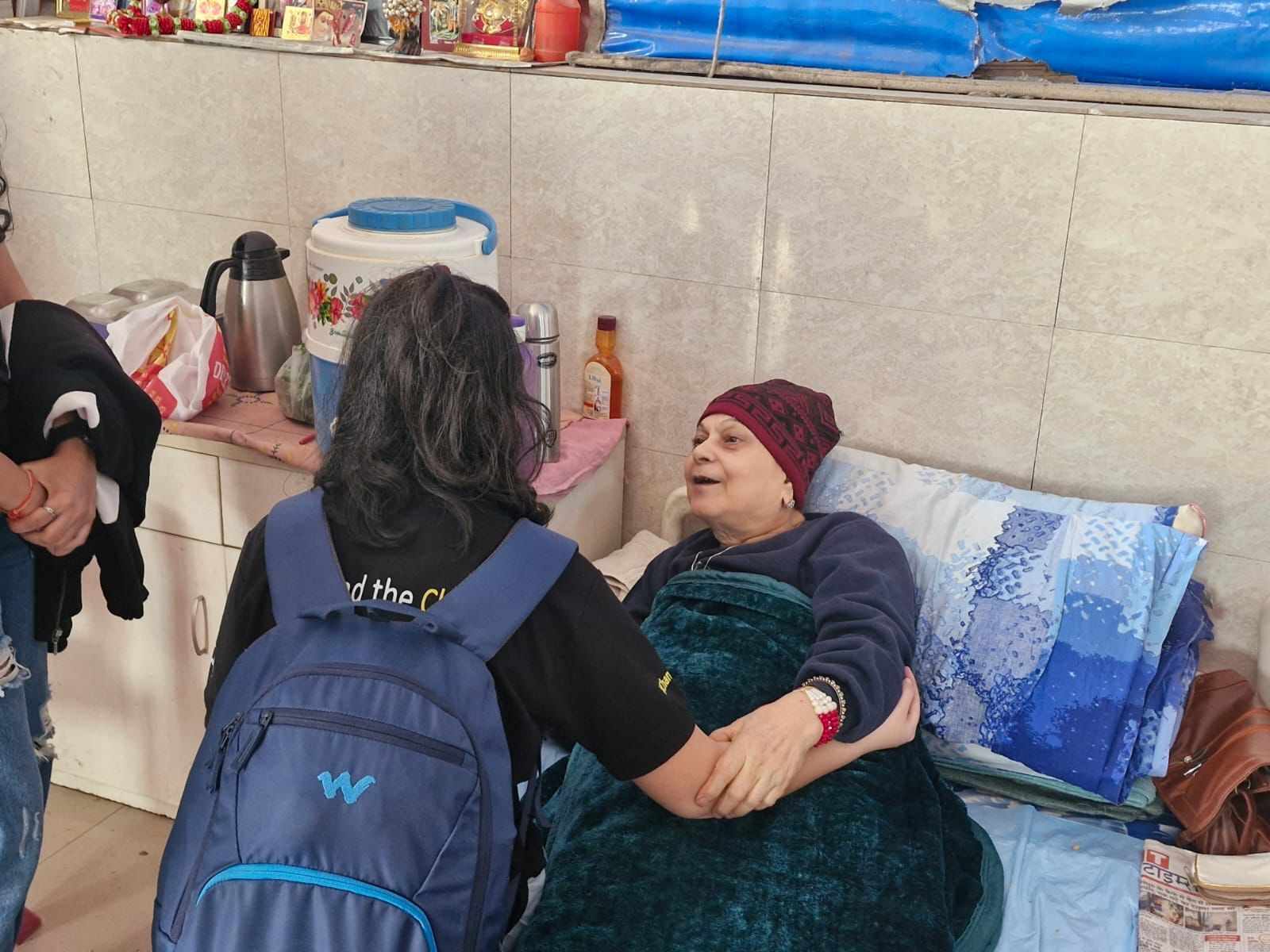 Initially, the team faced problems convincing people with disabilities to open up about their clothing struggles
Initially, the team faced problems convincing people with disabilities to open up about their clothing struggles
As experts in adaptive fashion, these collaborators helped shape the designs to be both practical and stylish.
“The mentorship has been extremely helpful so far,” Mysha shares. “Dewey Clothing advises us on design while the team at Zyenika guides us on marketing and outreach.” These partnerships enabled the project to move beyond early prototypes. The team has since added innovations like magnetic-button shirts and is “even exploring adaptive versions of Indian wear, like sarees and kurtas”.
The team also sources surplus textiles from StyleFab, a Mumbai-based exporter, for their production needs.
While the project has seen progress, the students had to fight their fair share of battles, especially while trying to build trust with the community.
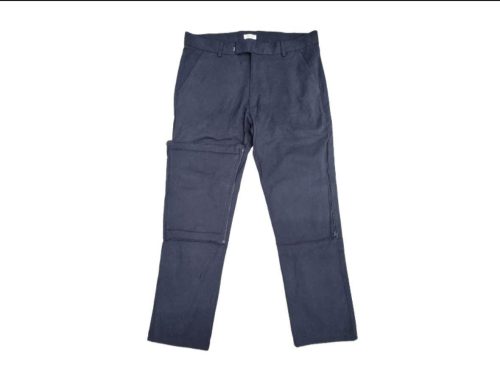 Dewey Clothing advises Enactus DCAC students on design, while the team at Zyenika guides them on marketing
Dewey Clothing advises Enactus DCAC students on design, while the team at Zyenika guides them on marketing
“One of the major challenges our team faced was convincing people with disabilities to open up about their clothing struggles,” Avishi admits. “We had to engage consistently and make them feel heard.” Gradually, the team broke through this barrier and began to understand the nuances of the issues they were trying to solve.
Funding was another hurdle. But by backing their vision with solid research and demonstrating the real need for adaptive clothing, they earned support from funders like Oncocare, which has played an important role in helping them move forward.
“Balancing academics with the project has been tough too,” explains Mysha. “We have daily meetings after 6:30 pm. As second and third-year students, we study right after college and before those meetings. It’s definitely hectic, but we love what we are doing, and that keeps us motivated.”
What happens when design meets empathy?
To market their adaptive clothing, the team at Project Riayat relies on word of mouth, taking their designs directly to people who need them. They have hosted desensitisation camps in partnership with the Association of People with Disabilities (APD), teaching communities about disability, empathy, and the importance of inclusive products. Their efforts have reached 800 individuals so far, spreading awareness and understanding in schools and offices.
“Along with marketing and selling our adaptive clothing, we want to educate and bring about a shift in how society perceives disabilities,” Mysha smiles.
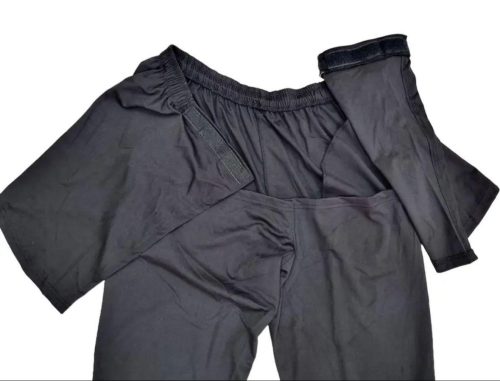 The team at Enactus DCAC is always brainstorming over new designs for their adaptive clothing line
The team at Enactus DCAC is always brainstorming over new designs for their adaptive clothing line
With growing interest in their designs, the team recently received their first major order — 350 adaptive clothing units from the Maharani Foundation. To ensure affordability, they conducted need assessment surveys, based on which they priced each piece between Rs 1,000 and Rs 1,500. “We realised that people are willing to pay this amount,” Mysha explains.
But for the team, success isn’t just about the numbers. It’s about what the clothes represent.
The success of Project Riayat lies not just in the clothes they create but in how they have stitched together a sense of inclusivity, dignity, and purpose. “When someone notices our clothes and tells us how much it will help them, that’s when we know we have truly done something meaningful,” Avishi reflects.
Edited by Khushi Arora; All pictures courtesy Enactus DCAC
News